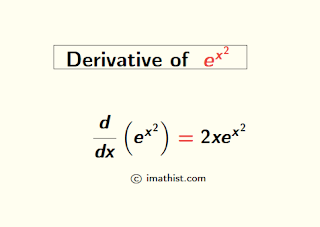The function e to the power x2 is written as
Recall the first principle of derivatives: The derivative of a function f(x) by first principle is defined by the limit:
We will use this to find the differentiation of e to the power x2.
Derivative of
Let us put
So we obtain that
= limh→0
= limh→0
= limh→0
= limh→0
= limh→0
Let u=h(2x+h). Then u tends to zero when h tends to 0.
Thus, the derivative of e^x^2 by first principle is 2xe^x^2.
Derivative of
Let u=x2.
Then
Now, the derivative of
Therefore, the differentiation of e to the power x2 is equal to the product of 2x and e^{x^2}.
Also Read:
Derivative of root x + 1 by root x
FAQs
Q1: What is the derivative of e^x^2?
Answer: The derivative of
